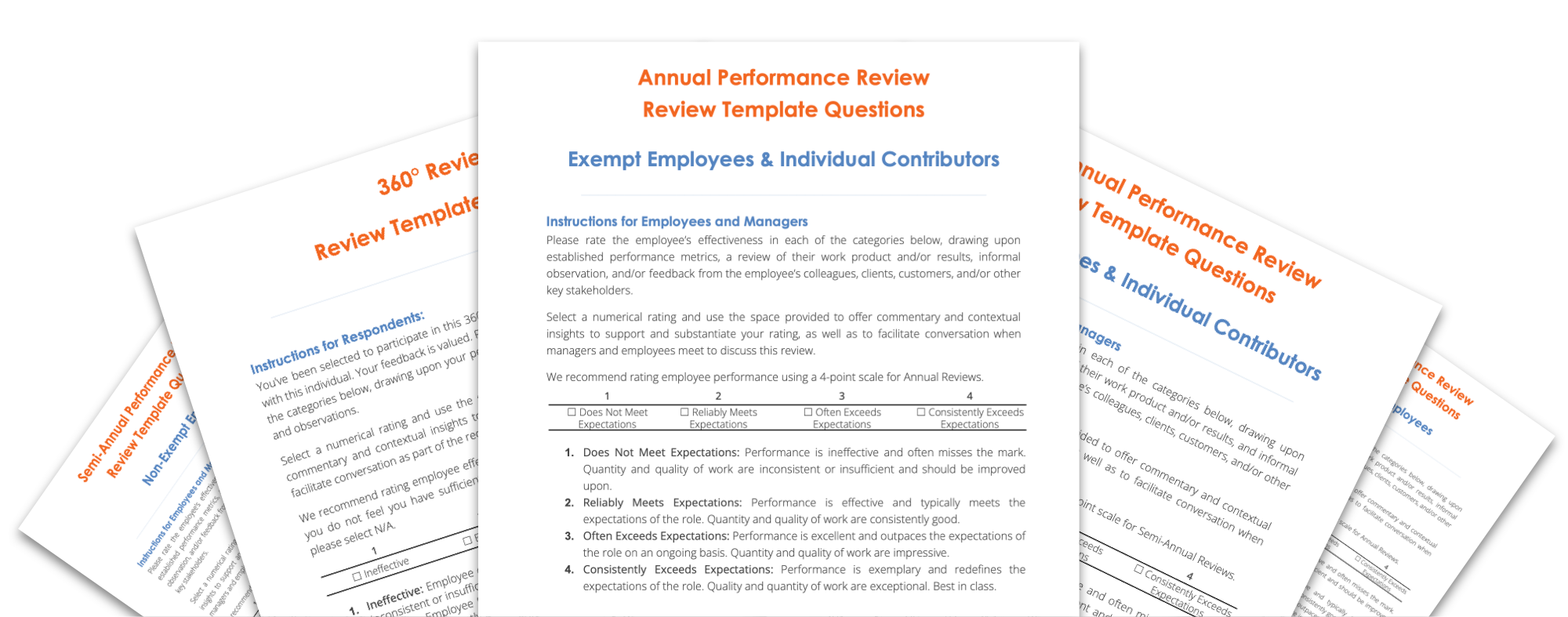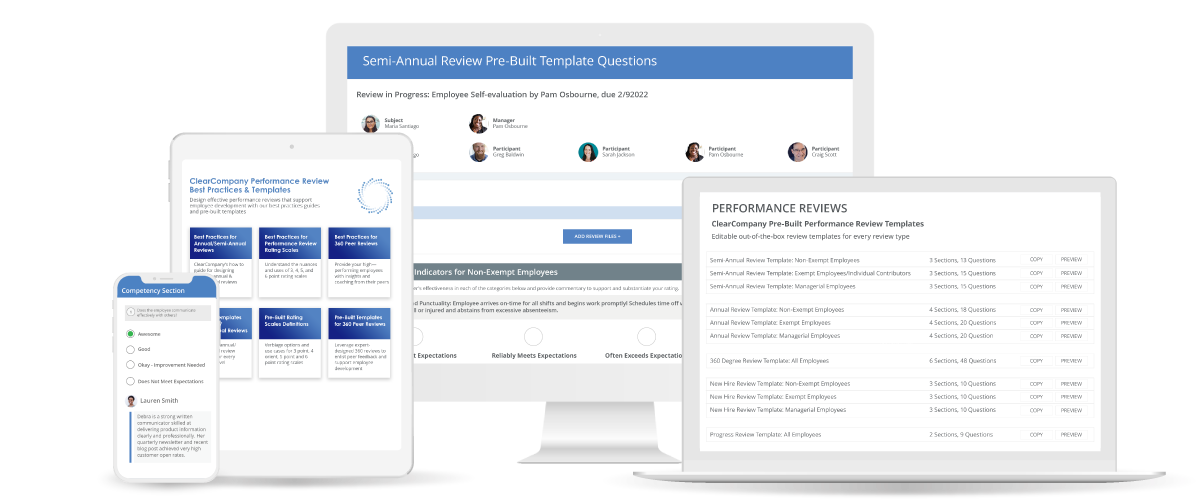Performance reviews are a challenging part of performance management. In fact, only 13% of employees and managers — and just 6% of CEOs — feel their company’s performance review system is useful. These discussions are essential to strengthen bonds between managers, team leaders, and employees, so it’s important to make them as effective as possible. Performance evaluations help to develop motivated top talent who are invested, engaged, and satisfied in their roles.
What is the Main Purpose of Performance Reviews?
Performance reviews are an opportunity for managers to evaluate how their employees are doing at work and ensure they’re on track to fulfill their responsibilities. Reviews tell managers quite a bit about employee performance:
- Where does the employee excel, and what are their weaknesses?
- Is the employee a high performer?
- Has the employee gained any new skills or knowledge?
- Is the employee a good candidate for a raise or promotion?
For employees, it’s an opportunity to ask questions, discuss their career goals, and create new plans for the future. Regular reviews ensure they’re aware of how they’re doing at work and continue to develop their skills while at your company.
During performance reviews, you can gauge employees’ motivation levels on an individual basis, and leaders can get a feel for how employees view their own engagement and performance. Then, you can develop strategies to bring up engagement scores and productivity all around.
@ClearCompany has 6 tips for conducting your most effective employee #PerformanceReviews yet:Performance management statistics show that 92% of employees want feedback more than once a year, and 43% of highly engaged employees receive feedback at least once a week. That shows how constructive feedback is critical for establishing trust, motivation, and job satisfaction.
7 Performance Review Tips for Managers to Prepare in Advance
So how can managers conduct more effective performance reviews that are actually beneficial for everyone involved? We’re sharing six performance review tips for managers to help build better relationships and develop more A-players.
1. Get employee feedback on your review process.
It’s important that companies pay attention to how their employees feel about their performance review system. After all, it’s no secret that performance evaluations aren’t exactly popular. 55% of employees don’t feel that annual performance reviews improve their performance at all. An astonishing 85% of employees would consider quitting if they felt their performance review was unfair.
Take the time to talk with managers and employees about your current performance review process. Ask them what works, what doesn’t, and other methods they would find useful. Find out what motivates employees most, whether that’s a shout-out in the team meeting or setting goals for the year. Then, adjust your review process accordingly wherever possible, making sure to track the results of those changes.
2. Have more frequent, less formal conversations about performance.
Traditional performance reviews and once-a-year feedback processes are largely considered inadequate. Younger employees are more averse than other generations to annual reviews — 34% of millennials reported crying during an annual review. 97% of Gen Z employees are open to continuous feedback. Now is a good time to try relieving the stress associated with performance review meetings with a more relaxed approach.
More frequent conversations that are open, ask for employee feedback, and address things in real-time not only alleviate stress, they also lead to better outcomes. Employees at companies that use continuous feedback systems are 65% more motivated and 66% more productive. That’s not to say that formal performance reviews are obsolete. They just shouldn’t be the only performance conversation all year.
3. Come prepared and make time for every performance review.
As managers know, it’s easy to overlook or not have time to address accomplishments from early on in a review period. You can avoid this pitfall and make evaluations easier by creating a record of performance-related events as they occur. That’s easiest to do when using a performance management system that allows you to easily give frequent and consistent feedback. Avoid skipping check-ins or reviews — they’re a vital part of performance management.
Performance reviews should be consistent and thorough, and both managers and employees should come prepared. With set review cycles and performance management software, managers get automatic review reminders. They can look over past reviews and analyze goal progress before each evaluation. Employees won’t be surprised by a review and know what they’ll be discussing with their manager.
During #PerformanceReviews, use #ActiveListening techniques to give better feedback. Get more performance review tips from @ClearCompany:4. Train managers on active listening.
According to Forbes, effective leaders listen not just to respond but “to understand, to learn, and to guide.” That’s where active listening skills come in. Active listening requires managers to go into conversations with a “different mindset.” Train managers to ask questions, avoid making assumptions or judgments and pay attention to verbal and nonverbal cues from employees.
Active listening also requires that managers stay present during employee performance reviews, blocking out distractions like notifications and phone calls. They should be genuinely curious about what their employees have to say and help them feel heard and understood. That builds trust with employees, which is essential for an engaged, productive workforce.
Listen to learn, not to respond, period. Stifle a desire to offer a personal anecdote, a quick solution or a reason why or why not. World-class listeners can be quite quiet as they take the time necessary to metabolize what they’ve heard. Only offer a story if it illuminates a point; often the best response is to acknowledge that you’ve heard someone and want to consider what they have said fully. - Joanne Heyman, Heyman Partners via Forbes
5. Give specific, actionable feedback.
It’s important to use specific examples when giving feedback, especially when performance issues arise. Instead of making a value judgment, talk about a real incident or example of poor performance. For example, you might say, “A customer you spoke with on August 25th reported that you were dismissive on the phone when they needed help. Let’s talk about what happened and how to respond in the future.”
If an employee skipped steps on a project, discuss their importance and make a checklist to reference going forward. Keep the focus on the facts and specific areas for improvement. These examples will ensure any performance appraisal feedback is clear and allow you to set goals for improving performance. If your company uses performance management software, it’s easy to keep track of feedback, other notes, and employee goal progress.
6. Plan for the future during performance reviews.
Forward-looking performance reviews can increase productivity by 13 percent. That means performance reviews are the perfect time to set goals and discuss career development. We’ve talked about the positive effects of goal-setting before. It’s motivating, improves engagement, and provides a framework for evaluating performance.
Setting goals is a proven strategy for helping employees improve and thrive. With a performance management system, you can efficiently set and track goal progress. You can also choose a time frame for goal completion, get regular updates from employees, and easily keep accurate records.
7. Offer support and opportunity during reviews.
Performance appraisals are intended to reward strong performance and address problems as they arise. With this in mind, be receptive to supporting employees whether they need improvement or are ready to learn new skills. That shows that you are interested and invested in employees’ success at work.
Conduct better #PerformanceReviews by offering support to struggling employees and growth opportunities to those ready for the next step in their careers. Get more #EmployeeReview tips from @ClearCompany:For example, if a salesperson needs to strengthen their soft selling skills, explore internal mentoring or additional training. Create a plan to work on the skill and be sure to follow up on progress. If an HR specialist wants to earn SHRM certification, discuss how your business can help them achieve that goal. It’s worth your while to do so: employee retention is 34% higher when they have access to professional development opportunities.
How to Conduct Successful Performance Reviews as a Manager
Employee evaluations seem like a daunting task, but investing time and effort in performance management processes that work will pay off in the long run. You’ll experience improved performance, stronger relationships with team members, and employees who are motivated to do their best at work.
When done right, performance evaluations are a powerful tool for fostering employee growth and engagement while also driving your team's overall performance.
1. Preparation is Key
Before the review, take time to gather all relevant information. This includes past reviews, performance metrics, project outcomes, and peer feedback. A clear understanding of an employee's overall performance will help you provide accurate and constructive feedback.
2. Set Clear Goals
Performance reviews should always be tied to specific, measurable goals. These targets provide a solid benchmark against which to measure an employee's progress and effectiveness. Be sure to collaborate on setting goals to ensure mutual understanding and buy-in.
3. Encourage Self-Evaluation
Invite your employees to assess their own performance before the review. This encourages self-reflection and can provide valuable insight into what they think about their own performance and goals. It also promotes a two-way conversation during the review rather than a one-sided critique.
4. Constructive Feedback
Always deliver feedback – both positive and constructive – in a clear and empathetic manner. Highlighting strengths and achievements boosts morale and motivation. When addressing areas for improvement, avoid negative language. Instead, frame it as opportunities for growth and learning. Offer actionable suggestions and support to help your employees improve.
5. Two-Way Conversation
A successful performance review should be a dialogue, not a monologue. Ask standard performance review questions, but also encourage your employees to voice their thoughts, ideas, and concerns. This can provide you with valuable insights into what motivates them, any challenges they're facing, and how you can better support them.
6. Regular Check-ins
Don’t limit performance discussions to annual reviews. Regular check-ins, preferably on a weekly basis, can help maintain open communication, provide timely feedback, and address issues as they arise. This ongoing dialogue makes the formal review less stressful and more productive for both parties.
7. Document Everything
After the review, document key points, new or adjusted goals, and action plans. This serves as a reference for both you and the employee and will be invaluable when preparing for future reviews.
8. Follow Up
Performance reviews shouldn’t end when the meeting does. Regular follow-ups are crucial to ensure that the employee is making progress on their action plans and feels supported to reach their goals and develop their skills.
The manager's role in performance reviews is to both evaluate past performance and inspire future growth and development. By fostering an open, constructive dialogue around performance, managers can help employees feel valued, motivated, and connected with team and organizational goals.
Remember, every employee is unique, so it’s essential to tailor your approach to each individual. By doing so, you can conduct successful performance reviews and build stronger relationships with your team members. Ultimately, successful performance reviews contribute to a positive work culture and a high-performing team.
Want to have better performance conversations and create more A-players? Take the first step toward more effective reviews with a personalized demo of ClearCompany’s Performance Management software. Sign up for your free demo today.



